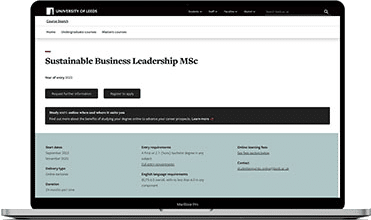What Are Sustainable Business Models? (With Examples)
Sustainable Business Leadership
As the importance of environmental, social and governance (ESG) factors continues to rise, businesses are challenged to rethink their strategies and leverage innovative business models to embed responsible and sustainable practices into their organisations.
In this blog, we explore three examples of sustainable business models and consider how you can leverage business model innovation as part of your company’s sustainability strategy.
Learn more about our Sustainable Business Leadership courseWhat are sustainable business models?
A sustainable business model, or business model for sustainability, is a framework for how organisations create, deliver and capture value based on sustainable development principles. Rather than a traditional business model that is focused solely on profit, a business model for sustainability can help organisations to tackle sustainability challenges whilst continuing to operate profitably. By addressing a range of ecological and social issues within the framework, companies can evolve their purpose, products and processes whilst contributing positively to the planet.
Examples of sustainable business models
With plenty of business sustainability models available (including the doughnut economics model we covered in another blog), it’s important for companies to assess which ones relate closest to their product, service and goals. Here are three popular examples:
1. The eight-step sustainable business model by Szekely and Dossa
The Francisco Szekely and Zahir Dossa eight-step model approaches sustainability beyond the triple-bottom-line by exploring steps ranging from organisational purpose to PR transparency. They propose that businesses should focus on addressing a societal need from the get-go and view profitability as not an end point, but a method of supporting sustainability. Here are their eight steps to success:
- Sustainability mission: What is the purpose of your organisation?
- Long-term vision: What will your organisation look like in twenty-five years?
- Sustainability strategy: Identify your stakeholders and develop a plan to impact them in a positive way.
- Implementing sustainability strategy: How can you engage your stakeholders for maximum impact?
- Measuring sustainability performance: How do you measure non-financial performance?
- Transparency and accountability: Can you pass the newspaper test?
- Scaling: Can sustainability scale?
- Sustainability innovation: What makes sustainability innovations unique?
2. The eight sustainable business model archetypes by Bocken, Short and Evans
The eight sustainable business model archetypes from Nancy Bocken, Sam Short and Steve Evans describe the solutions and opportunities that organisations can take advantage of when building a business model for sustainability. The eight tactics were developed to accelerate the research and practice of sustainable business models:
- Maximise material and energy efficiency.
- Create value from ‘waste’.
- Substitute with renewables and natural processes.
- Deliver functionality rather than ownership.
- Adopt a stewardship role.
- Encourage sufficiency.
- Re-purpose the business for society/environment.
- Develop scale-up solutions.
3. The triple layered business model canvas (TLBMC) by Joyce and Paquin
Alexandre Joyce and Raymond Paquin designed the triple layered business model canvas (TLBMC) to explore methods of sustainable innovation in business.
The TLBMC is a tool for integrating environmental and social factors into an organisations business model through a lifecycle approach and stakeholder perspective. The addition of the environmental and social layers to the economic layer of the business model canvas can generate multiple types of value.
- Economic: Considering partners, activities, resources, value proposition, customer relationships, channels and customer segments.
- Environmental: Considering supplies and outsourcing, production, materials, functional value, end-of-life use, distribution and user phase.
- Social: Considering local communities, governance, employees, social value, societal culture, scale of outreach and the end user.
Why should companies endorse sustainable business models?
Business models for sustainability have multiple benefits for organisations and their stakeholders including customers, employees, suppliers, communities, wider society and the environment.
Sustainable businesses tend to attract and retain the best talent and develop loyal customer and supplier bases. Furthermore, organisations making positive contributions to the environment and society can benefit from an enhanced reputation and new growth areas.
Endorsing sustainable business models is a balancing act for companies who have profitability at the forefront of their business agendas, particularly those with limited funds, short-term financial goals, or shareholders to accommodate. However, by dedicating investment and resources to initiatives, businesses can benefit from sustainability models on a long-term basis whilst simultaneously improving their impact on the planet.
How can businesses implement sustainable business models?
To effectively build sustainability into a business’s DNA and overcome sustainability issues, here are some possible steps to follow:
- Evaluate current practices to understand areas for improvement.
- Engage stakeholders at all levels and listen to their opinions to build support.
- Identify a sustainable business model which closely aligns to your needs.
- Set measurable objectives to achieve long-term sustainability goals.
- Innovate your purpose, product and processes using your elected sustainable business model as a framework.
- Communicate developments in your sustainability efforts transparently and consistently to relevant business stakeholders and customers.
- Monitor your business’s progress against key performance indicators and continually seek out improvements.
Learn about sustainable business models
As part of our online Sustainable Business Leadership Masters/Postgraduate Certificate (PGCert), you’ll study a Sustainable Business Strategies module that will support you in analysing, planning and evaluating sustainability practices – just one of many benefits to studying the online sustainability course.
You’ll assess sustainable business models in depth, using case studies and real-world examples to understand their importance. You will also apply your learnings to make strategic judgements around social, community, and environmental values in business.
“We’re taking a critical look at the role of business and exploring those links between sustainability and business, considering the role of business in driving positive change for sustainability. We consider alternative business models, and look at circular economy, social enterprise, sustainability standards and partnerships between business and social actors in sustainability.”
Study Sustainable Business Leadership online with the University of Leeds
Keen to pursue a career in sustainability? Our course teaches sustainability techniques, concepts, and analytical skills to help you solve complex business issues.
It’s a result of a collaboration between Leeds University Business School and the School of Earth and Environment at the University of Leeds. You’ll learn to develop sustainable business strategies, gaining the skills that managers need, and ultimately supporting the transition to a more sustainable economy.

Did you enjoy this blog? Here’s some related sustainability content you may be interested in:

Want to learn more about our online Sustainable Business Leadership course?
Check out the course content and how to apply.

